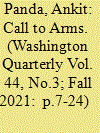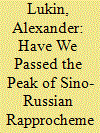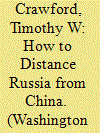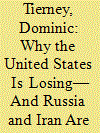|
|
|
Sort Order |
|
|
|
Items / Page
|
|
|
|
|
|
|
| Srl | Item |
| 1 |
ID:
181342


|
|
|
|
|
| Summary/Abstract |
The Biden administration has promised to revise US global force posture and alter the vast constellation of overseas forces, bases, and capabilities that underpin America’s ability to deter adversaries, counter threats, and protect allies. It has signaled an intent to reduce US presence in the Middle East to make it more commensurate with the region’s relative strategic importance (i.e., “right-size” forces) and bolster its posture in the Indo-Pacific, much like previous administrations attempted to do.1 To this end, the administration has a Global Force Posture Review underway and has already drawn down US combat forces in Afghanistan, effectively ending the almost 20-year US presence in the country.
|
|
|
|
|
|
|
|
|
|
|
|
|
|
|
|
| 2 |
ID:
181340


|
|
|
|
|
| Summary/Abstract |
Having declared his nuclear deterrent “complete” following the testing of three intercontinental-range ballistic missiles (ICBMs) and a thermonuclear device in 2017, North Korean leader Kim Jong Un has been overseeing a period of qualitative nuclear modernization and quantitative force expansion. North Korea’s nuclear forces continued to grow during the short-lived period of diplomacy with South Korea and the United States in 2018 and 2019. In January 2021, in reviewing the accomplishments of the five-year period following North Korea’s Seventh Party Congress in 2016, Kim alluded to “tactical nuclear weapons” among other significant accomplishments concerning his nuclear forces during that era. This was a notable statement. Traditionally, North Korea has referred to its nuclear capabilities euphemistically as “strategic” weapons. When references to tactical nuclear weapons (TNW) would appear in state media, they would reference US nuclear capabilities; North Korea has never acknowledged that the United States withdrew its last nuclear weapons from the Korean Peninsula in December 1991.
|
|
|
|
|
|
|
|
|
|
|
|
|
|
|
|
| 3 |
ID:
181344


|
|
|
|
|
| Summary/Abstract |
US relations with China and Russia remain deeply problematic. Any hopes for change for the better under a Biden presidency were quickly dashed by the harsh Sino-US exchanges in Alaska in March and by the fallout from “SolarWinds,” Moscow’s brazen hacking attempt.1 No breakthroughs were expected or forthcoming at the US-Russia summit meeting in June, while celebrations of the Communist Party of China’s 100th anniversary in July reconfirmed Beijing’s strident foreign policy course. What’s more, Washington’s principal authoritarian rivals have been cooperating to mutual advantage. Summits between Xi Jinping and Vladimir Putin have been a hallmark of Sino-Russian diplomacy since 2013. It was telling that, right after the US-China encounter in Alaska, Foreign Ministers Wang and Lavrov met in Guilin, China to pointedly condemn Western “interference” in their internal affairs.
|
|
|
|
|
|
|
|
|
|
|
|
|
|
|
|
| 4 |
ID:
181347


|
|
|
|
|
| Summary/Abstract |
Russian-Chinese rapprochement is one of the most important modern geopolitical shifts. Recently, it seems that those who argue that closer relations between Moscow and Beijing stem from their converging interests, values, and worldviews have won out over those who claimed theirs is essentially a marriage of convenience—a tactical arrangement for countering attacks by the United States and its allies. According to some forecasts, the mutual understanding between the two countries will deepen in the foreseeable future and they will form, if not a formal then at least a de facto, alliance. Events indicate that, in fact, Russia and China have strengthened their interaction.
|
|
|
|
|
|
|
|
|
|
|
|
|
|
|
|
| 5 |
ID:
181346


|
|
|
|
|
| Summary/Abstract |
Democracies are engaged in a broad, persistent asymmetric competition with authoritarian challengers who seek to reshape the global order to suit their interests. The competition is playing out across multiple intersecting domains, and the information space is a critical theater.1 In this competition, Russia and China intentionally choose tools that give them the upper hand.
|
|
|
|
|
|
|
|
|
|
|
|
|
|
|
|
| 6 |
ID:
181348


|
|
|
|
|
| Summary/Abstract |
Military alignment between Russia and China is increasing.1 Although some still downplay its significance, alarm is warranted.2 Many perceive the dangerous trend but conclude that the United States can do little to detach Moscow from Beijing.3 Still, there are serious calls for the United States to find ways to improve relations with Moscow and draw it away from China.4 These are, in essence, calls for the United States to use a wedge strategy—a policy to move or keep a potential adversary out of an opposing alliance.5 Yet, when it comes to how to do that, debate is constricted by the usual grooves of foreign policy orthodoxy and flawed answers to two basic questions: first, what is the mainspring of Russia-China convergence? Misdiagnosis here makes it harder to discern potential remedies and easier to prescribe ones that make matters worse. Second, what is the essential danger that their convergence poses? Confusion here makes it harder to gauge whether this can and should be changed at an acceptable cost.
|
|
|
|
|
|
|
|
|
|
|
|
|
|
|
|
| 7 |
ID:
181341


|
|
|
|
|
| Summary/Abstract |
Japan has been on a run for the last eight years. Former Prime Minister Abe Shinzo, whose two terms in office in 2006–07 and 2012–20 made him the country’s longest-serving prime minister, vowed to reinvigorate Japan after two decades of stagnation, and he made important progress. While he was applauded for his diplomatic activism and for revamping the national security bureaucracy, little attention has been paid to the rise of economic statecraft during his tenure within Japan’s foreign policy and national security calculus, a policy and focus that continues in the Suga administration.
|
|
|
|
|
|
|
|
|
|
|
|
|
|
|
|
| 8 |
ID:
181345


|
|
|
|
|
| Summary/Abstract |
Russia has come to occupy an anomalous position in Western strategic thought. While former US president Barack Obama dismissed Russia as a “regional power” following its 2014 occupation of Crimea and invasion of eastern Ukraine, both the Trump and Biden administrations have identified Russia as one of the United States’ principal rivals in an era defined by strategic competition among great powers.1 To a significant degree, though, the United States continues to think about Russia as more of a disruptor than a true great power rival. Though widespread, that view misreads both the nature and the durability of Russian power and underestimates the extent to which Russia remains a potent competitor whose preferences Western leaders will have to take into account.
|
|
|
|
|
|
|
|
|
|
|
|
|
|
|
|
| 9 |
ID:
181343


|
|
|
|
|
| Summary/Abstract |
At a press conference in 2015, Barack Obama predicted that Russian intervention in Syria would end in ignominy and Moscow would be “stuck in a quagmire.”1 Rather than repeat America’s own tough experience in recent Middle Eastern wars, however, the Russian operation helped Syrian president Bashar al-Assad seize the initiative and recapture Aleppo. Since the 9/11 attacks, major American wars in Afghanistan, Iraq, and Libya have all been strategic failures. During the same period, however, US rivals Russia and Iran achieved significant success during campaigns in Georgia, Ukraine, Syria, and Iraq. Why does the United States lose, whereas Russia and Iran win?
|
|
|
|
|
|
|
|
|
|
|
|
|
|
|
|
|
|
|
|
|